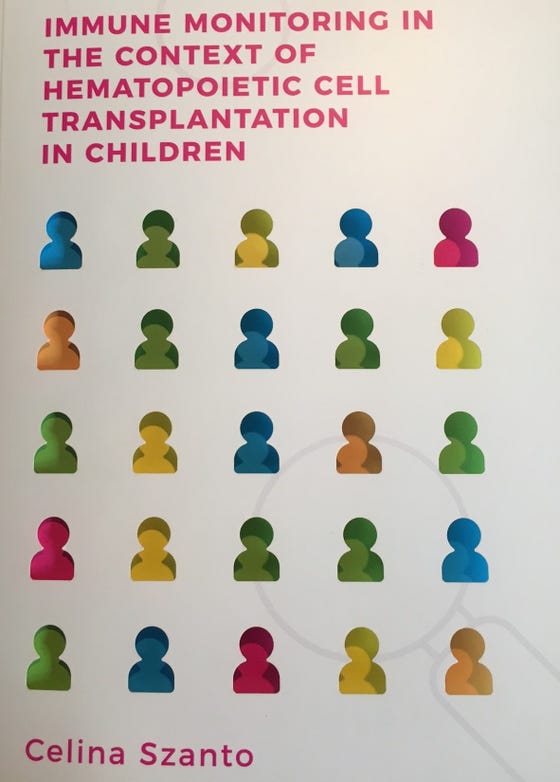Dec 15: Value of immune monitoring after stem cell transplantation in children

Immune monitoring of children after hematopoietic stem cell therapy may provide useful information to improve efficacy of treatment and reduce the occurrence of complications. In addition, immune monitoring may in the future be used for a personalized treatment in children undergoing hematopoietic cell transplantation.
It is often unknown how a patient's immune system responds to medication after a hematopoietic cell transplantation (HCT). Also, little is known about factors that can predict serious complications due to treatment at an early stage. Monitoring of the immune system during the course of the disease and treatment may provide better insight into the effects of (immune) therapy.
Monitoring efficacy
Celina Szanto (Center for Translational Immunology, UMC Utrecht)) describes in her PhD thesis the results of immune monitoring in children with high-risk neuroblastoma. Certain immune cells (T cells) do not function properly after HCT. In contrast, cells that suppress the immune system (Treg cells) function well and these cells are largely present in the blood of high-risk neuroblastoma patients. This new finding may explain why immune therapy is insufficiently effective in some of these children, an insight that would have remained unknown without immune monitoring.
Monitoring complications
She also describes the immune system of children after an allogeneic HCT to investigate how complications arise and whether there are biomarkers that may predict these complications. Immune monitoring shows that children with a rapid CD4+ T cell recovery are more likely to survive severe acute transplant disease compared to children with a slow CD4+ T cell recovery. Children who have not been pre-treated with chemotherapy have a higher risk of developing autoimmune cytopenia and lung complications after HCT. Acute graft-versus-host disease and/or serotherapy are risk factors for autoimmune cytopenia, while viral reactivation of adenoviruses is a risk factor for lung complications. In the period preceding autoimmune cytopenia, often elevated immunoglobulin levels in the blood are measured.
Patient stratification
Celina Szanto concludes in her thesis: “Our results identified several factors that might be important for the success and outcome of HCT. The field is only at the beginning of critically evaluating the clinical utility of immune monitoring approaches, some of which involve novel assays. Immune monitoring will facilitate the ‘switch’ from a one-size-fits-all approach to a more detailed patient stratification and future personalized treatment.”
PhD defense
Celina Szanto (1992, Zeist) defended her PhD thesis on December 15, 2020 at Utrecht University. The title of her thesis was “Immune monitoring in the context of hematopoietic cell transplantation in children”. Supervisors were prof. dr. Alwin Huitema (Division Laboratory, Pharmacy and Biomedical Genetics, UMC Utrecht) and prof. dr. Jaap Jan Boelens (Division Children, UMC Utrecht). Co-supervisor was dr. Stefan Nierkens (Center for Translational Immunology, UMC Utrecht). Celina Szanto works as a project manager in the Molenaar research group at the Princess Maxima Center for Pediatric Oncology in Utrecht, focusing on precision medicine and high-throughput screening in neuroblastoma and other solid tumors.

